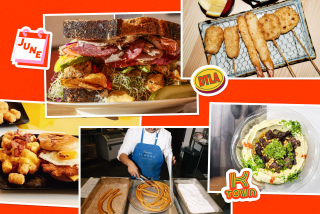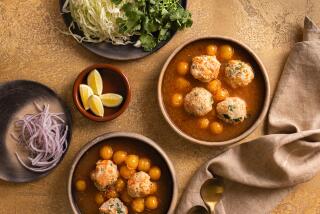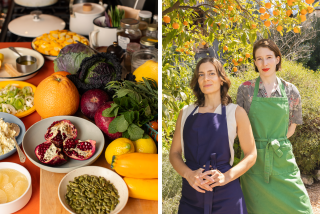Season of smoke
Just about every night this time of year, the most seductive smell breezes into my apartment like a taunt. Somewhere some neighbor has fired up a hardwood grill for dinner while I’m trapped with neither backyard nor Weber.
It always makes me think the slogan for summer food should be “Things go better with smoke.” And then it makes me think of ways to get the smoke without the fire.
As it happens, these days there are so many superb smoked foods on the market that I don’t need a grill to evoke the flavor and the fragrance my neighbors sweat over. An ever-growing array of artfully smoked choices, from applewood-infused bacon to smoked black pepper, can impart the same irresistible potency to the best fresh ingredients of the best season for cooking. Smoke almost qualifies as one of the four elements.
A little smoked duck or a few smoked shrimp can take a potato salad to another level. Smoked mozzarella imparts an almost meaty aspect to eggplant gratins. And a heaping tablespoon of smoked paprika puréed with smoky piquillo peppers will produce the most amazing all-purpose dip/spread/dressing since the first avocado was mashed into guacamole.
The haunting flavor of smoke always adds either an undertone or a high note, or induces general harmony between the super fresh and the subtly oaked.
It’s one of the little ironies of the food world that a technique devised as a way to preserve food, especially for the winter, is so useful with summer ephemera. Smoked seafood is the most outstanding partner that corn pancakes could ever have, as a first course or hors d’oeuvres. Smoked tuna reinterprets a salade niçoise with the double-teamed flavors of fish and wood smoke. And smoked black pepper turns seared tuna or swordfish into steak from a dimension far, far away from one-note beef.
Every year it seems more smoked foods turn up to compete with fresh ones and wind up complementing them. Some are new, many just improved. Smoked duck makes smoked turkey look passé. Smoked mussels can still be found in a can but are more likely to be sold in the same case as caviar. The best smoked salmon is made from the wild fish out of the Pacific Northwest; its lean flesh takes on oaky intensity with no oiliness. (Echo Falls brand from Seattle is the best I have tasted since I first learned the difference between Nova and lox.) Any good cheese shop will stock smoked cheeses, from Holland (Gouda), England (Cheddar), Spain (Idiazabal) and Germany (Bruder Basel), to name a few.
Aroma in a jar
My latest discovery is smoked black pepper, which I spotted in a restaurant trade magazine and immediately ordered online. Initially I suspected it would be something as synthetic-seeming as Liquid Smoke (which is another story). But upon opening the one-pound jar, my only question was: Where has this been all my summers? The aroma seems to have drifted straight in from a barbecue pit in Texas, and in fact the producer, Alex Gardega of Cattleman’s Smoked Spices, says his intention was to evoke his former home state, “where they smoke everything.”Smoked pepper goes everywhere the straight stuff will, but its smooth aggressiveness doubles the smoky flavor in some dishes. My usual smoked trout spread made with cream cheese tasted a lot livelier with a hefty dash of Cattleman’s. And when I substituted the spice for regular crushed Tellicherry peppercorns in a panko crust for sauteed fillets of fish and for tuna steaks, they could have come off a campfire. (It’s sold only in bulk from https://www.chefswarehouse.com ; one pound is $8.64 plus shipping.)
Cattleman’s also smokes kosher salt, which is a nice idea that dissipates as it dissolves, and Hungarian paprika, which I was reluctant to invest in because I still have plenty from Spain. I found mine in the Canary Islands a while back, but the same brand, La Chinata, is now almost as commonplace as celery seeds in American food shops. And it’s worth adding to the most overloaded spice rack.
Unlike regular paprika, whose greatest value seems to be the color it adds to deviled eggs, the smoked kind has a dusky, potent flavor that reminds you with a punch that paprika is a pepper. In a variation on the Spanish sauce romesco, a sauce that has been endlessly twisted and tweaked in countless cookbooks and all over the cyber kitchen, the paprika combines with piquillos and sweet, toasted Marcona almonds to make a sensation that could put salsa out of business.
One indicator of how suited smoked foods are to summer is their prevalence in places where they know what hot is. When I was in New Orleans a few years back, it seemed half the chefs in town were smoking mushrooms to top pizzas or add to pasta or toss with salads.
In the Florida Keys, where apparently everyone fishes and has a backyard smoker, every bar and cafe seems to serve what they all call “fish dip,” a magic mixture of smoked tuna or marlin whipped with mayonnaise, relish, onion and hot pepper. Spread on Club crackers, it tastes like August even in February.
And then there is the whole tradition in Mexico of giving a fresh chile a new identity through smoking: jalapeños are made over into chipotles, poblanos into anchos. The payoff is easy-to-use, easily amplified smokiness — there is no better sauce for crab cakes (or Dungeness crab or grilled fish) than mayonnaise spiked with minced chipotles, garlic and cilantro.
But a hot climate is not the only smoky inspiration. On a trip to Estonia recently, I had a sensational open-face sandwich in a roadside bar that combined sautéed wild mushrooms and smoky salmon on brown bread. Even stranger, in Belfast I once discovered the only pasta salad worth making over and over: warm penne tossed with top-grade smoked salmon, sour cream, olive oil, julienned butter lettuce and plenty of chives and dill.
Some smoked foods admittedly could be made from scratch, including salmon, trout and tuna. But this is the season for easy eating, and there’s no stigma to slitting open a package of ready-to-slice magret duck breast rather than going through the brining and smoking that D’Artagnan did. And other smoked foods are best left to the experts, particularly pepper and paprika. To infuse those, Gardega smokes them in a coffee roaster over mixed hardwood during the course of a day or so.
Many smoked products are also so well done commercially there’s no sense in trying to do them at home. Ducktrap River Fish Farm in Maine distributes extraordinary smoked shrimp, scallops and mussels that make beautifully flavored additions to any hot weather classic. (Specialty markets carry them, but they are also available online at https://www.ducktrap.com .)
With any of these, you can only think Tennessee Williams had the right idea but the wrong medium. The drama of summer and smoke should be in the kitchen.
*
(BEGIN TEXT OF INFOBOX)
Fresh corn cakes with smoked salmon
Total time: 20 minutes
Servings: 4
Note: Smoked trout or shrimp can substitute for the salmon. The cakes can also be made silver-dollar size to serve as hors d’oeuvres.
2 ears corn, shucked
1/3cup coarse-grind yellow cornmeal
1/2cup flour
1 teaspoon sugar
1 teaspoon kosher salt
1/2teaspoon baking soda
2 green onions, green part only, chopped
1 fresh jalapeño, seeded and minced
1 large egg
1/2cup whole milk
2 tablespoons unsalted butter, melted
Peanut or canola oil for frying
1/2cup crème fraîche or sour cream
4 tablespoons chopped cilantro
4 ounces thinly sliced smoked wild salmon, cut into thin strips
1. Steam the corn until tender, about 5 minutes. Cool, then slice off the kernels. Place in a mixing bowl and add the cornmeal, flour, sugar, salt, baking soda, green onions and jalapeño.
2. In a separate bowl, whisk together the egg, milk and melted butter. Pour the egg mixture into the dry ingredients and mix well.
3. Heat about 3 tablespoons oil in large skillet over medium-high heat. Spoon a heaping measuring tablespoon of corn batter into the oil and spread the batter to form a pancake about 3 1/2 inches across. Cook until set on one side, then flip and continue cooking until lightly browned and cooked, 2 to 3 minutes on each side. Add additional oil if necessary. Drain on paper towels and keep warm. (If necessary, work in batches, holding cooked pancakes in a warm oven while frying more.)
4. To serve, lay 2 pancakes on each serving plate. Spoon a little crème fraîche on the center of each pancake and top with some cilantro. Divide the strips of salmon among the pancakes on top of the cilantro. Serve immediately.
Each serving: 443 calories; 13 grams protein; 33 grams carbohydrates; 3 grams fiber; 30 grams fat; 11 grams saturated fat; 92 mg. cholesterol; 1255 mg. sodium.
*Seared tuna with smoked black pepper
Total time: 10 minutes
Servings: 4
Note: Adapted from a recipe in “The ‘21’ Cookbook” by Michael Lomonaco (Doubleday, 1995). Smoked black pepper is available at chefswarehouse.com.
4 top-quality tuna steaks, 6 to 8 ounces each, 1 inch thick
1/2cup panko (Japanese bread crumbs)
4 tablespoons smoked black pepper
Salt to taste
4 tablespoons extra-virgin olive oil
1. Let the tuna come to room temperature.
2. In a shallow dish, combine the panko and smoked pepper. Season the tuna well on both sides with salt. Dredge the tuna steaks in the pepper mixture, coating well on all sides and pressing to make the crumbs and pepper adhere.
3. Heat the oil in large heavy skillet over medium-high flame. Place the tuna in the hot oil and sear 2 to 3 minutes on each side for medium rare (if you want a complete crust, sear 2 minutes on each side and about 1 minute to sear edges). Serve immediately.
Each serving: 433 calories; 55 grams protein; 15 grams carbohydrates; 2 grams fiber; 16 grams fat; 2 grams saturated fat; 102 mg. cholesterol; 114 mg. sodium.
*Smoked duck salad with potatoes and haricots verts
Total time: 45 minutes
Servings: 4
Note: Smoked duck is available at Nicole’s Gourmet Foods in South Pasadena, Surfas in Culver City and on the Internet at dartagnan .com or amazon.com.
1 tablespoon Dijon mustard
2 tablespoons Champagne or white wine vinegar
7 tablespoons hazelnut oil
1 shallot, minced
4 cornichons, minced
2 tablespoons chopped chives
1 tablespoon chopped tarragon
1/2 teaspoon salt, or to taste
1/4teaspoon freshly ground white pepper, or to taste
1 bay leaf
2 cloves garlic, peeled
1 tablespoon coarse sea salt
1/2pound haricots verts, trimmed
16 baby Yukon Gold or fingerling potatoes, scrubbed
2 to 3 ounces mesclun or baby arugula
1 pound smoked duck breast
1/2pint cherry or grape tomatoes, halved
1/4cup toasted chopped hazelnuts
1. Combine the mustard and vinegar in a small bowl and whisk to blend. Whisk in the hazelnut oil until emulsified. Add the shallot, cornichons, chives and tarragon and whisk again. Season with salt and pepper to taste. Set aside.
2. Combine the bay leaf, garlic and sea salt in a large pot and add 3 quarts water. Bring to a boil. Add the haricots verts and blanch until tender, 3 to 5 minutes. Remove the beans with a slotted spoon and pat dry. Add the potatoes to the water and boil until tender, 15 to 20 minutes. Drain, reserving 2 tablespoons cooking water. Cool the potatoes for about 10 minutes, then slice them into one-fourth-inch slices. Cut the haricots verts into 1-inch pieces. Combine in a large bowl.
3. Add the reserved cooking water to the vinaigrette and whisk to blend. Pour the dressing over the potato mixture and toss with rubber spatula to coat completely. Season with salt and more pepper if needed.
4. Divide the mesclun among 4 serving plates. Divide the potato-bean mixture among the plates, spooning it onto the greens. Cut the duck into thin slices, then crosswise into half-inch-wide strips. Strew the duck slivers over the potato mixture. Arrange the tomato halves around perimeter. Sprinkle with toasted hazelnuts and serve.
Each serving: 557 calories; 37 grams protein; 33 grams carbohydrates; 6 grams fiber; 32 grams fat; 3 grams saturated fat; 162 mg. cholesterol; 2,303 mg. sodium.
*Smoked paprika romesco sauce
Total time: 20 minutes
Servings: 2 cups
Note: Marcona almonds are available at Whole Foods markets, Bristol Farms and Trader Joe’s. Smoked paprika is available at La Española in Harbor City or Surfas in Culver City.
1/2cup whole blanched almonds, preferably Marcona, roasted and salted
1 (7-ounce) jar piquillo peppers, drained and coarsely chopped, or 1/2 (13.75 ounce) can
1/2cup extra-virgin olive oil, preferably Spanish
1 tablespoon smoked paprika
1/8to 1/4 teaspoon cayenne
2 cloves garlic, minced
1 tablespoon sherry vinegar
Salt to taste
1. Combine the almonds, piquillos, olive oil, smoked paprika and cayenne in a blender. Process until smooth.
2. Transfer to a bowl; stir in the garlic and vinegar and salt to taste. Serve as a spread on bread, a sauce for grilled fish or meat or as a dip for roasted potatoes.
Each tablespoon: 69 calories; 1 gram protein; 1 gram carbohydrates; 0 fiber; 7 grams fat; 1 gram saturated fat; 0 cholesterol; 31 mg. sodium.
More to Read
Sign up for The Wild
We’ll help you find the best places to hike, bike and run, as well as the perfect silent spots for meditation and yoga.
You may occasionally receive promotional content from the Los Angeles Times.










